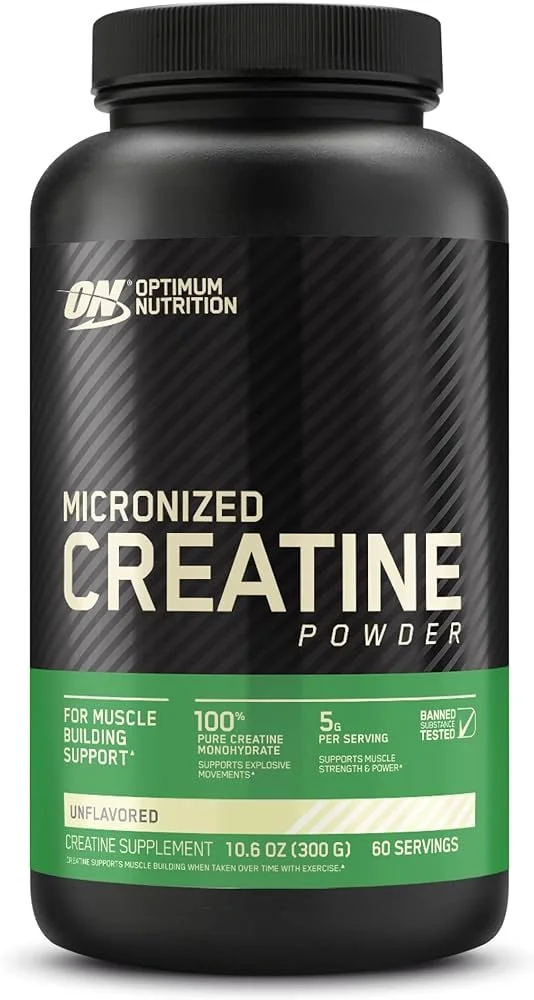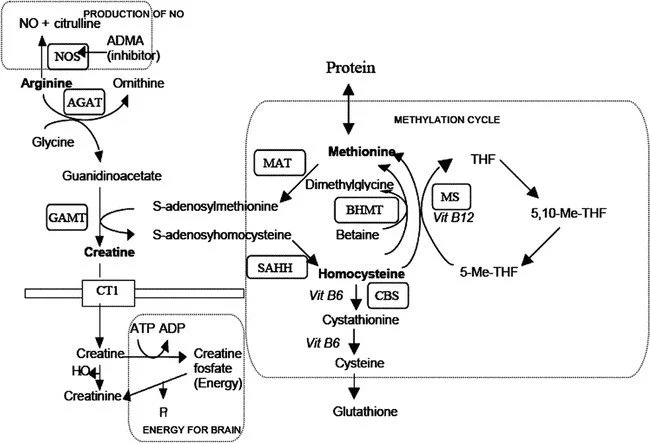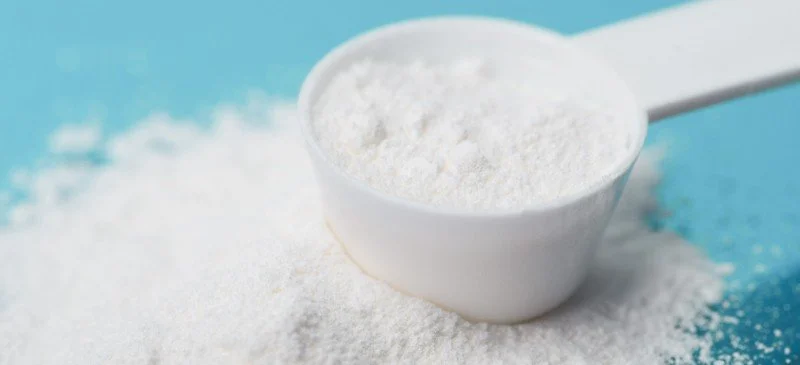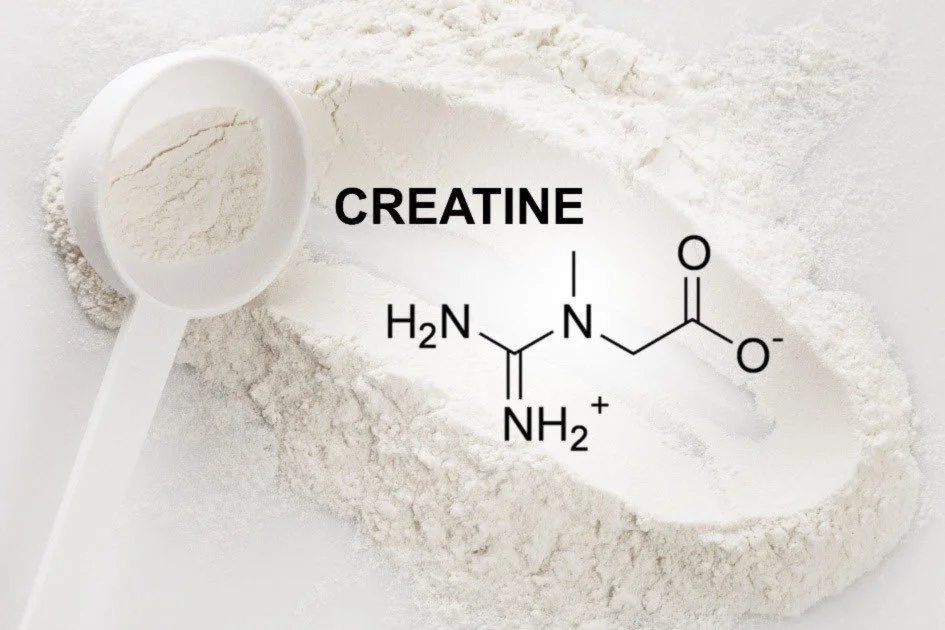Creatine: To Take or Not to Take
If you’ve been to your local wholesaler such as Costco, you may have seen one of these creatine powder jars before. Creatine monohydrate, better known as creatine, is a hotly debated supplement used by members of the emerging fitness scene in hopes of improving their muscle mass and definition. Often touted by fitness influencers as being essential, many avid gym goers have incorporated creatine into their supplement regimens, accounting for its increased usage. But why creatine?
What is creatine and how does it work?
Despite the various forms of creatine, the most prevalent form used by athletes is creatine monohydrate. For the sake of simplicity, in this article, any further uses of the word “creatine” will refer to creatine monohydrate.
Creatine is a natural substance (Can be synthesized by your body or come from an external source such as a powder) comprised of 3 amino acids: methionine, glycine, and arginine. It is synthesized in a process involving 2 enzymes: glycine amidinotransferase (AGAT) and guanidinoacetate methyltransferase (GAMT). The 2 enzymes work in conjunction with one another as AGAT produces guanidinoacetate acid which is then methylated by GAMT to produce creatine. In simple terms, AGAT produces a substance that is chemically processed by GAMT into usable creatine. Creatine helps replenish ATP stores in skeletal muscles (Accounts for 95% of creatine in the body) to provide short bursts of energy.
Where can I find creatine?
Besides being naturally produced by the body, creatine is found in various foods, such as red meats, and dietary supplements (i.e powders). Some possible sources include…
1. The human body! - Believe it or not, the human body actually produces around 1g of creatine per day. The liver, pancreas, and kidneys synthesize creatine and deliver approximately 95% of all creatine (Both ingested and produced) to skeletal muscles to provide them with energy. The remaining 5% is distributed to other organs. It is important to note that most of a person’s daily creatine intake comes from external sources.
2. Diet - Creatine can be found in protein-rich foods, specifically red meat (Pork, veel, etc), seafood, and trace amounts in animal milk. This accounts for an additional 1-2 grams of creatine.
3. Dietary Supplements - Averaging 5 grams per serving, manufactured creatine serves as one of the largest sources of creatine for an average person. Creatine is primarily packaged and sold in large quantities to consumers. Mixed with a liquid (Or dry scooping if you’re desperate - We do not condone this method as it could lead to later dietary complications among other things), creatine can be easily and safely incorporated into a person’s diet.
Typically, the body stores creatine as phosphocreatine in skeletal muscles to provide energy when needed. However, taking large doses of creatine isn’t the answer as eventually, you will hit a saturation level for the substance, resulting in the excess being filtered out and going to waste. Overloading on creatine can also result in increased strain on the kidneys. For most athletes, one way to incorporate creatine is to use a loading phase of 20-25 gram doses of creatine per day (Split into various doses) and then switch to a maintenance dose of 3-5 grams of creatine per day (14 mg/pound or 30 mg/kg).
What does creatine do?
Between the various methods of obtaining creatine and the brands of manufactured creatine, one thing holds consistent: its function. According to evidence-based research, some of the various functions of creatine include…
Increased Muscular Strength, Size, and Output - Creatine stored in muscles can provide more energy for athletes, allowing them to increase exercise volume, resulting in strength gains as well as increased muscle mass and performance.
Increased Muscular Recovery - Creatine has been shown to increase the concentration of the anabolic hormone IGF-1, which aids in preventing muscular breakdown as well as promoting muscle growth and repair.
Injury prevention - Creatine has the potential benefit of reducing an athlete’s frequency of dehydration and cramping, thereby limiting physical injuries
Cognition and brain health - Creatine may improve cognitive performance, especially in seniors.
Aging - Combined with active exercise, creatine has shown some benefits in maintaining physical health.
Primarily, creatine is utilized by the athlete/gym population who seek to improve their athletic performance by utilizing the boosts of energy the substance provides.
Sounds great, but what are the drawbacks?
Despite sounding like the magic bullet that seems to be what every athlete or gym rat wants, creatine has its drawbacks. Some side effects from creatine include…
Possible Kidney Strain - Taking too much creatine can result in increased strain on the kidneys which can prove to be detrimental to kidney health. While no definitive research has proven that creatine adversely affects the kidneys, it still is a possibility.
Bloating - Creatine promotes water retention and muscle growth, which increases a person’s body weight. This can create a sense of feeling bloated. While being uncomfortable, bloating is otherwise harmless.
Stomach Discomfort - Large doses of creatine can result in stomach discomfort. To minimize this, follow a loading phase or take smaller doses.
Lack of Increased Benefits - Besides causing bloating and stomach discomfort, taking too much creatine does not increase its benefits. In fact, it is just a waste of money as it is filtered out by the kidneys and other organs without providing any additional benefit. This is because the skeletal muscles have been saturated with creatine and can no longer accept it.
Despite this, research has shown that creatine is safe in most healthy individuals. It is important to consult a healthcare professional before starting any sort of creatine usage to determine if this is a suitable option for you.
So, is it really worth it?
At the end of the day, it comes down to what you as an individual are looking for. For athletes, creatine is a viable option due to its possible performance benefits and reduction of the potential for injury. Creatine is deemed legal by most sporting associations including the NCAA, FDA, and Olympic Committee. For those looking for that extra pump in the gym, the boost in energy provided by creatine may prove beneficial. At the same time, it is important to consider the drawbacks of creatine usage and balance that against its benefits. In conclusion, it is important to consider all the facts and make an educated decision.
This article is written only for informational purposes. Please consult your healthcare provider to discuss your current health before starting any creatine usage.
Sources:
“The Best Creatine for Men of 2023.” Sports Illustrated, 8 Dec. 2023, https://health.si.com/best-creatine-for-men/?campaignid=20553356324&adgroupid=152174162823&adid=673980797482&gclid=CjwKCAiA4smsBhAEEiwAO6DEjaPOCzDNQTjv08NqJ6iAkT6Ojtc2R_9k5XWAb_c4acGjdgdzaQzUXBoCaV4QAvD_BwE.
“Creatine Loading: What Is It? And Does It Work?” BlenderBottle, BlenderBottle, 16 July 2022, www.blenderbottle.com/blogs/health/what-is-creatine-loading-and-how-does-it-work#:~:text=The%20Benefits%20of%20a%20Creatine%20Loading%20Phase&text=If%20you%20take%205g%20daily,after%20the%20first%20few%20days.
“Creatine.” Mayo Clinic, Mayo Foundation for Medical Education and Research, 13 Dec. 2023, www.mayoclinic.org/drugs-supplements-creatine/art-20347591.
“Creatine: Overview, Uses, Side Effects, Precautions, Interactions, Dosing and Reviews.” WebMD, WebMD, www.webmd.com/vitamins/ai/ingredientmono-873/creatine. Accessed 1 Jan. 2024.
da Silva, Robin P, et al. “Creatine Synthesis: Hepatic Metabolism of Guanidinoacetate and Creatine in the Rat in Vitro and in Vivo.” American Journal of Physiology. Endocrinology and Metabolism, U.S. National Library of Medicine, Feb. 2009, www.ncbi.nlm.nih.gov/pmc/articles/PMC2645018/#:~:text=Creatine%20can%20be%20obtained%20from,1).
professional, Cleveland Clinic medical. “Creatine.” Cleveland Clinic, https://my.clevelandclinic.org/health/treatments/17674-creatine. Accessed 1 Jan. 2024.
Walle, Gavin Van De. “Can You Take Too Much Creatine? Side Effects and Dosage.” Healthline, Healthline Media, 13 Feb. 2023, www.healthline.com/nutrition/too-much-creatine#bottom-line.






